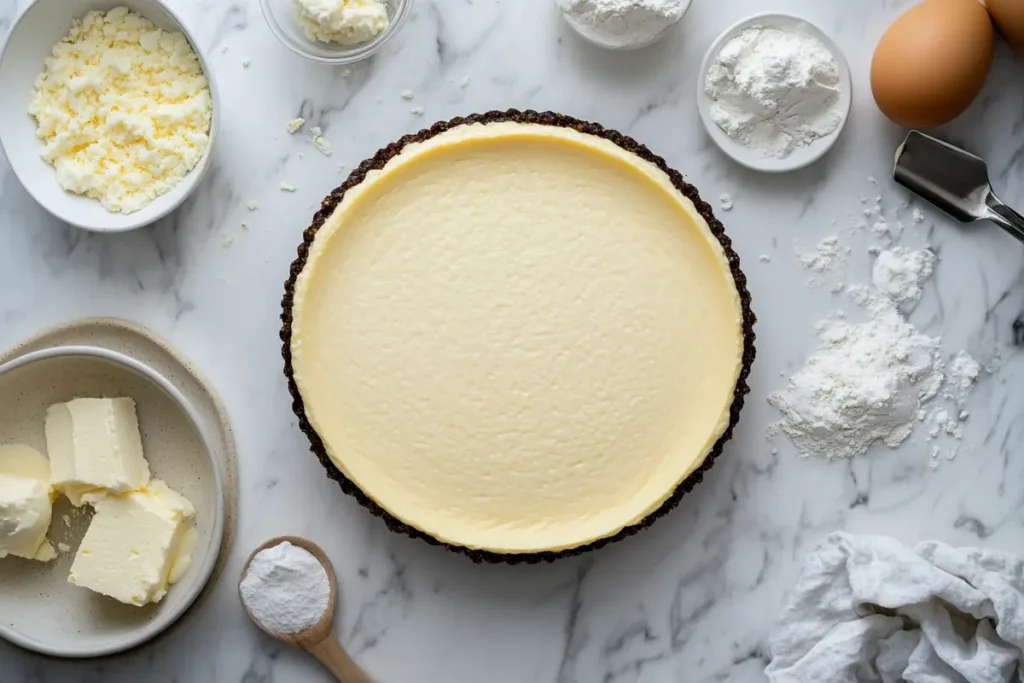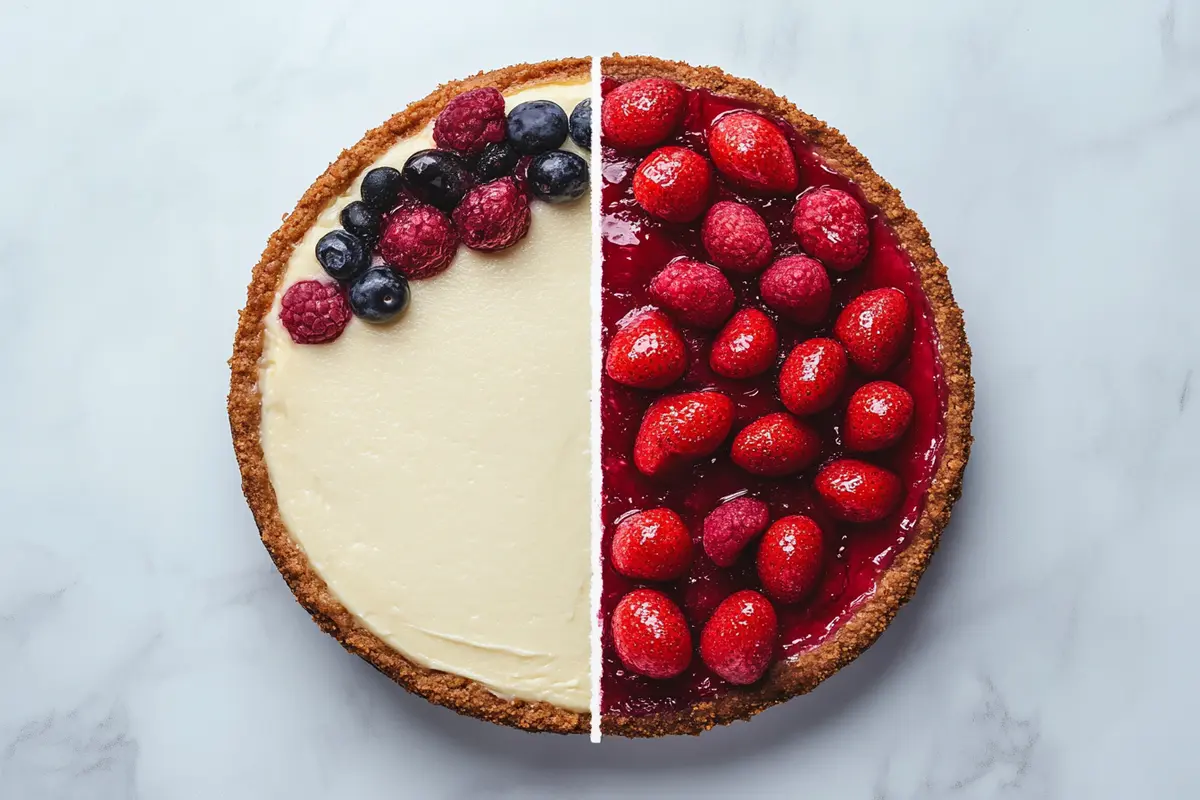Cheesecake is a dessert loved worldwide for its creamy richness and versatility. But when it comes to preparing this delicacy, an age-old debate emerges: Is cheesecake better baked or unbaked? Each type has its unique charm, taste, and texture, leading to a polarizing discussion among dessert enthusiasts. In this article, we’ll explore the defining features, advantages, and drawbacks of baked and unbaked cheesecakes to help you decide which one takes the crown.
Let’s delve into the fascinating world of cheesecakes, where we’ll cover everything from preparation techniques to health considerations, all while unraveling the mystery of this delicious dilemma.
Introduction to Cheesecake Styles
What is Cheesecake?
Cheesecake, in its simplest form, is a dessert made from cream cheese, sugar, and eggs, set on a crust made of graham crackers, cookies, or pastry. This rich dessert has been cherished for centuries, with variations dating back to ancient Greece. Over time, regional differences in preparation and ingredients have given rise to the modern debate of baked versus unbaked cheesecakes.
The Two Main Types: Baked vs. Unbaked Cheesecakes
The two primary styles of cheesecake are baked and unbaked, each with its distinct characteristics. Baked cheesecakes are cooked in an oven, resulting in a dense, custard-like texture. In contrast, unbaked cheesecakes rely on refrigeration to set, yielding a light and creamy consistency. Both types are beloved, but their differences extend beyond just taste and texture.
Why This Debate Matters
So, why does it matter whether cheesecake is baked or unbaked? It’s more than just a preference; the choice affects the flavor profile, texture, preparation time, and even the occasion it’s served at. Whether you’re planning a summer picnic or a cozy dinner party, the type of cheesecake you choose can make all the difference.
Stay tuned as we dive deeper into the nitty-gritty details of baked and unbaked cheesecakes, exploring their merits and helping you determine which might suit your taste buds best!
Baked Cheesecake – A Closer Look
What Makes a Cheesecake Baked?
A baked cheesecake is all about precision. This style uses a mixture of cream cheese, sugar, eggs, and sometimes sour cream, all cooked in the oven. The eggs in the batter are the stars here they thicken and set as the cake bakes, giving it a dense, custard-like consistency. Baking transforms the creamy mixture into a firm, silky dessert that can hold its shape beautifully when sliced.
But that’s not all! The crust is usually baked too, adding a satisfying crunch that contrasts with the smooth filling. This method brings out deep flavors that you simply won’t get from a no-bake version.
Ingredients and Techniques Used in Baked Cheesecakes

The secret to a great baked cheesecake lies in the technique. First, a water bath is often used to keep the cheesecake moist and prevent cracks on the surface. This involves placing the springform pan into a larger pan filled with hot water, which evenly distributes the heat. Another trick? Cooling the cheesecake slowly—turning off the oven and letting it sit with the door slightly open.
The ingredients also play a crucial role. Sour cream or heavy cream is often added to maintain a smooth texture, while high-quality cream cheese enhances the richness. Don’t forget the crust—graham crackers, digestive biscuits, or even chocolate cookies can make for an unforgettable base.
Advantages of Baked Cheesecake
So, is cheesecake better baked or unbaked? For many, baked cheesecake wins for its texture and flavor. The creamy, dense filling melts in your mouth, while the crust offers a satisfying crunch. It’s a dessert that feels indulgent and luxurious, perfect for special occasions. Additionally, baked cheesecakes can support heavier flavors, like chocolate or pumpkin, without collapsing.
Challenges in Making a Perfect Baked Cheesecake
That said, baking cheesecake isn’t without its challenges. Overbaking can lead to cracks or a dry texture, while underbaking results in a runny center. Mastering the water bath, controlling oven temperature, and allowing proper cooling are all essential steps for success. Still, once you’ve nailed it, the reward is well worth the effort.
Part 3: Unbaked Cheesecake – A Detailed Analysis
The Essence of an Unbaked Cheesecake
Unbaked cheesecakes skip the oven altogether, relying instead on refrigeration to set. Gelatin, whipped cream, or even citrus juice often acts as the thickening agent. This style results in a light and creamy dessert that’s perfect for warmer months or when you’re short on time. The lack of eggs and baking also makes it easier to adapt to dietary needs or specific preferences.
Unbaked cheesecakes are essentially no-fuss and no-stress, making them a hit among beginners or those who prefer a chilled, mousse-like texture.
Key Ingredients and the Role of Gelatin
In an unbaked cheesecake, gelatin is a game-changer. It stabilizes the filling, ensuring it holds its shape without the need for heat. Alternatively, whipped cream can be folded into the batter to achieve that airy texture. Cream cheese remains the base ingredient, but additional flavors—like vanilla, lemon, or berries shine in this preparation.
The crust, typically made from crushed cookies and butter, doesn’t require baking either. It sets in the fridge, saving time and energy while keeping the kitchen cool.
Benefits of Unbaked Cheesecake
When asking, is cheesecake better baked or unbaked, the unbaked variety wins for ease and simplicity. It’s quicker to prepare and doesn’t demand the same level of precision. Plus, its light and fluffy texture pairs wonderfully with fresh fruits or whipped cream toppings. Unbaked cheesecakes are also great for experimenting with flavors, from tropical mango to tangy lime.
Potential Drawbacks of an Unbaked Cheesecake
However, unbaked cheesecakes aren’t without limitations. They can struggle to hold up under heavy toppings or dense fillings. Without eggs and baking, the flavor might feel less complex compared to its baked counterpart. Additionally, gelatin-based versions can sometimes lack the creamy depth that defines a traditional cheesecake.
Still, for a dessert that’s fresh, quick, and versatile, unbaked cheesecake holds its own in the debate, proving that both styles have their unique appeal.
Taste and Texture Comparison
How Baked Cheesecakes Differ in Taste
When it comes to baked cheesecakes, the flavor is nothing short of indulgent. Baking caramelizes the sugar and enhances the rich, creamy notes of the cream cheese. This results in a dessert that feels luxurious and full-bodied. It’s no wonder people often describe baked cheesecakes as decadent! The subtle tang from sour cream or cream cheese also balances the sweetness beautifully.
The Unique Texture of Unbaked Cheesecakes
Unbaked cheesecakes, on the other hand, boast a light, mousse-like texture. Without eggs or baking, the cream cheese remains velvety smooth, creating a dessert that feels almost cloud-like. The lack of baking also allows fresh flavors like fruit or citrus to shine through without competing with the richness of a baked base.
Why Personal Preference Plays a Role
So, is cheesecake better baked or unbaked? That largely depends on your taste preferences. If you love a dense, rich dessert with a warm flavor, baked cheesecake is the way to go. But if you prefer something airy, refreshing, and easier to whip up, the unbaked version might just steal your heart. Ultimately, the decision boils down to the occasion, the toppings, and, most importantly, what you’re craving!
For more cheesecake inspiration, explore the unique twist of Strawberry Crunch Cheesecake from Favorite Flavor Recipes.
Which is Healthier?
Nutritional Comparison
When discussing is cheesecake better baked or unbaked, it’s worth considering the nutritional aspect. Baked cheesecakes often contain more eggs, heavy cream, or sour cream, leading to higher fat and calorie content. However, they’re also more satisfying in smaller portions due to their density.
Unbaked cheesecakes, being lighter, might seem healthier at first glance. While they often skip the eggs and cream, they can pack in sugar and gelatin to achieve that smooth texture. Choosing lower-fat cream cheese or fresh fruits can make an unbaked cheesecake a slightly healthier option.
Calorie and Fat Content Analysis
If you’re counting calories, both types of cheesecakes can be modified to suit your needs. Baked versions can use Greek yogurt or reduced-fat cream cheese to lighten the load, while unbaked ones can incorporate low-sugar alternatives and fruit-based toppings.
Are There Healthier Variations?
Absolutely! Both baked and unbaked cheesecakes can be tailored to include nutritious ingredients like nuts, whole-grain crusts, or fresh fruits. You might even explore gluten-free or vegan versions for a diet-friendly twist. Ultimately, the health factor lies in the recipe and portion size rather than the preparation method itself.
For more delicious dessert ideas, check out Cinnamon Roll Cheesecake for another creative take on cheesecake!
When to Choose Baked vs. Unbaked Cheesecake
Occasions for Baked Cheesecake
Baked cheesecake shines during formal gatherings or cold-weather celebrations. Its rich, custard-like texture makes it a favorite for holiday dinners, weddings, and special occasions where indulgent desserts take center stage. If you’re serving a dense chocolate or caramel-topped cheesecake, baking is the way to go, as the structure holds up beautifully under heavy toppings. The warm, cozy flavor of baked cheesecake pairs wonderfully with a hot cup of coffee or a dessert wine.
Ideal Times for Unbaked Cheesecake
Unbaked cheesecakes are perfect for casual summer get-togethers or when you’re short on time. Their light and airy texture, combined with chilled freshness, makes them a refreshing choice for picnics, potlucks, and family barbecues. Plus, since they don’t require an oven, unbaked cheesecakes are an excellent option for hot days when you’d rather not heat up your kitchen. Topped with fresh fruits or a drizzle of citrus glaze, unbaked cheesecakes deliver a delightful burst of flavor.
Seasonal Preferences and Recipes
Ultimately, whether you choose baked or unbaked cheesecake can depend on the season. Baked versions, with their comforting richness, feel at home in fall and winter, while unbaked cheesecakes are a summer favorite due to their cool and refreshing appeal. Asking, is cheesecake better baked or unbaked? often comes down to what fits the mood and setting best.
Tips for Perfecting Both Cheesecakes
Baking Techniques for Success
Perfecting a baked cheesecake takes a bit of finesse. Always use room-temperature ingredients to avoid lumps in the batter. Bake your cheesecake in a water bath to maintain moisture and prevent cracking. Once baked, let it cool gradually in the oven with the door ajar to minimize sudden temperature changes. If cracks appear, don’t worry they’re easily disguised with a generous topping of fruit or whipped cream!
No-Bake Tips for Ideal Consistency
For unbaked cheesecakes, achieving the perfect texture starts with the right thickening agent. Chill your cheesecake for at least 6 hours (or overnight) to allow it to set properly. A sturdy crust is key, so pack your cookie or graham cracker base firmly to prevent crumbling.
The Takeaway
Both baked and unbaked cheesecakes require specific techniques to shine. With these tips, you can create a dessert that’s not only delicious but also visually stunning. Whether you prefer the rich decadence of baked cheesecake or the light simplicity of unbaked, mastering the details is what takes your cheesecake game to the next level!
FAQs
Can you convert a no-bake cheesecake recipe into a baked one?
While it’s possible to adapt a no-bake recipe, the process isn’t straightforward. Baking requires eggs and additional ingredients to achieve the right structure and texture. Simply baking a no-bake recipe might not yield the desired results. Instead, it’s better to follow a recipe designed for baking if that’s your goal.
Which type of cheesecake lasts longer?
Typically, baked cheesecakes have a slightly longer shelf life, as the cooking process reduces moisture and potential spoilage. However, both types can last several days in the fridge if stored properly in an airtight container.

